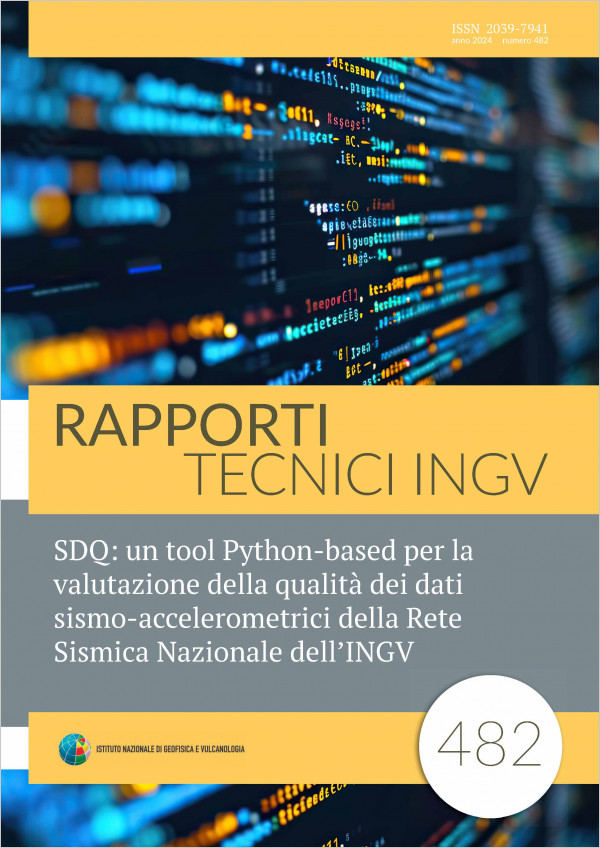SDQ: un tool Python-based per la valutazione della qualità dei dati sismo-accelerometrici della Rete Sismica Nazionale dell’INGV
Main Article Content
Abstract
In this paper, Seismic Data Quality (SDQ), a new application devoted to estimating the quality of the accelerometric and seismometric data recorded by the INGV National Seismic Network, is proposed. SDQ has been developed in Python with the main purpose of performing both:
• a systematic compatibility comparison between the accelerometric and velocimeter data of
sensors co‐located in correspondence with each seismo‐accelerometric recording site;
• to assign to each recorded event waveforms a quality class.
For the analyses, 230 multi‐parametric stations (i.e., equipped with both accelerometric and velocimeter channels) of the INGV National Seismic Network were considered. Data were acquired from January 2012 to March 2023 for a total of more than 15,000 event waveforms related to Italian earthquakes with local or moment magnitude (ML e/o MW) ≥ 3.5 and hypocentral distance (Ripo) ≤ 150 km. All data used in this report were downloaded from the EIDA
Italy node through the use of INGV webservices [1].
The quality of the data recorded from each single RSN station was assessed both using individual waveform metadata (Peak Ground Acceleration, PGA; Peak Ground Velocity, PGV) and the similarity of the whole time series by cross‐correlation algorithms. For each waveform, it was also possible to assign a quality class from A (excellent quality) to D (data to be rejected) by analysing both the root mean square of the signal envelope and the energy content of the Fast Fourier spectrum. The resultsallow us to highlight which RSN stations show, at present, a correct operation and which, on the contrary, need verification aimed at determining the cause of the inconsistency between the co‐ located sensors.
• a systematic compatibility comparison between the accelerometric and velocimeter data of
sensors co‐located in correspondence with each seismo‐accelerometric recording site;
• to assign to each recorded event waveforms a quality class.
For the analyses, 230 multi‐parametric stations (i.e., equipped with both accelerometric and velocimeter channels) of the INGV National Seismic Network were considered. Data were acquired from January 2012 to March 2023 for a total of more than 15,000 event waveforms related to Italian earthquakes with local or moment magnitude (ML e/o MW) ≥ 3.5 and hypocentral distance (Ripo) ≤ 150 km. All data used in this report were downloaded from the EIDA
Italy node through the use of INGV webservices [1].
The quality of the data recorded from each single RSN station was assessed both using individual waveform metadata (Peak Ground Acceleration, PGA; Peak Ground Velocity, PGV) and the similarity of the whole time series by cross‐correlation algorithms. For each waveform, it was also possible to assign a quality class from A (excellent quality) to D (data to be rejected) by analysing both the root mean square of the signal envelope and the energy content of the Fast Fourier spectrum. The resultsallow us to highlight which RSN stations show, at present, a correct operation and which, on the contrary, need verification aimed at determining the cause of the inconsistency between the co‐ located sensors.
Article Details
Section
Article

This work is licensed under a Creative Commons Attribution 4.0 International License.

